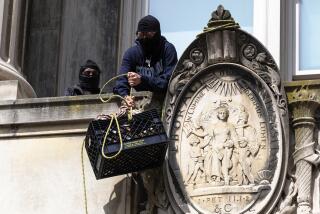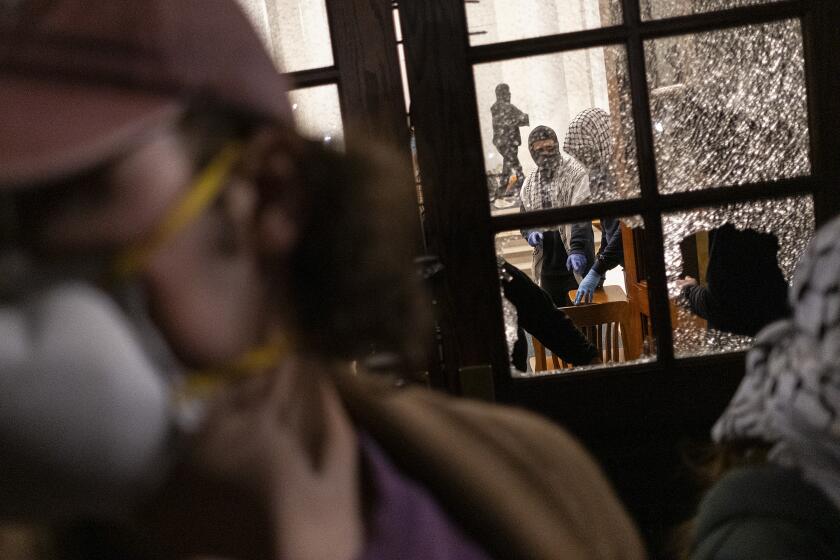Hamas victory spells misery in Gaza
The urban warfare that convulsed the Gaza Strip this week was bad enough, diminishing already scarce food, fuel and medicine in the impoverished Palestinian territory.
But the battle’s decisive outcome seemed only to make matters worse: The flow of humanitarian aid now depends on cooperation between the victorious Hamas gunmen and Israel, which controls most of the fenced-in territory’s border crossings.
So far the two sworn enemies aren’t speaking to each other. As a result, Gaza remained sealed off to the world Friday, even as aid workers warned of looming shortages of basic necessities that would exacerbate what they say is a humanitarian crisis.
“I am watching what is happening and worrying that Israel and other countries will turn Gaza into a prison,” Ahmad Abdel Rouf, a father of 12, said as he scrounged for food at shops and loaded up his donkey cart in Khan Yunis, in southern Gaza.
The 55-year-old said he supports Hamas, but echoed a fear of many other Palestinians that the militant Islamic movement’s rout of its secular rival Fatah may leave the victors incapable of providing for Gaza’s 1.5 million people.
Until this week, Hamas and Fatah shared power in the Palestinian Authority government that runs Gaza and parts of the West Bank. Israel and Western countries imposed a financial blockade on the two territories last year after Hamas won parliamentary elections because the militant group refuses to recognize the Jewish state and advocates its destruction.
Restricted passage of commercial cargo and humanitarian relief supplies is allowed.
Those goods, including United Nations-administered food aid to two-thirds of Gaza’s population, passed into the territory through border crossings under U.S.-supervised agreements between Israeli and Fatah officials who coordinated in Hebrew over walkie-talkies.
But Israelis closed the border crossings this week as fighting flared, and when it ended Thursday night, their vanquished Fatah counterparts were nowhere to be found.
Israeli officials say the sudden turn of events has put them in a quandary: how to let in relief supplies and avoid an explosive social crisis in Gaza without abandoning their policy of refusing to cooperate with Hamas.
“The people on the other side of the crossings today are Hamas militia and some of them are masked. That raises a question, and that’s why the border remains closed,” said Mark Regev, spokesman for Israel’s Foreign Ministry.
“We are aware that the humanitarian conditions in Gaza are not good, and no one in Israel wants to see them get worse,” he said. “But obviously the new situation has to be digested and we have to find ways to make things work.” Hamas appeared in no bigger rush to reopen Gaza’s border terminals.
Ismail Haniyeh, the Hamas prime minister, did not mention a need for open borders or international relief in a lengthy address Friday outlining his policy priorities and justifying his refusal to leave office. His Cabinet was formally dissolved late Thursday by Palestinian Authority President Mahmoud Abbas, the Fatah leader, who is based in the West Bank.
Hamas gunmen with laptop computers took up positions Friday at the Erez, Karni and Rafah border crossing posts, witnesses said. But the gunmen’s apparent mission was to keep the border closed and prevent wanted Fatah rivals, whose names were stored on their hard drives, from fleeing the Gaza Strip.
Israeli officials said the Fatah inspector in charge at Karni, the main goods terminal, had been kidnapped and his office looted. The Israelis said they also had lost contact with the Fatah official at Erez who had supervised crossings of ambulances and medical supplies.
“The men controlling the Erez crossing are the same terrorists who shelled the Israeli side last week,” said Efraim Sneh, Israel’s deputy defense minister. “We cannot work with these terrorists.”
Gaza’s economy had been crippled by the financial blockade, frequent Israeli border shutdowns and more than a year of sporadic factional clashes. The open warfare that erupted Monday closed and damaged hospitals and food distribution centers and killed two Palestinian relief workers for the United Nations. Most international aid agencies stopped work in Gaza altogether.
The strip continues to get water and electricity from Israel and Egypt, and the International Committee of the Red Cross managed this week to bring a small convoy of vehicles with blood supplies from Israel.
But relief workers and Palestinian residents said Gaza was perilously low on fuel, sugar, cooking oil, dairy products, animal feed, anesthesia, kidney dialysis equipment and some medicines.
“My children need special drugs and nutritional supplements that will soon disappear from the pharmacy if the closure continues,” said Gaza City shopkeeper Khalid Jamal, 45, whose sons, 4 and 6, are physically disabled.
John Ging, director of the U.N. Relief and Works Agency’s operations in Gaza, said his staff hoped to resume food distribution over the weekend but said stockpiles would not last more than a few weeks.
“We realize it’s a challenge for Israel to open the border because they don’t want to deal with Hamas,” said Liz Sime, who directs Care International’s distribution of food and medicine in Gaza. “But it is imperative that Israel find a way through this quickly, because the people cannot tolerate the closure much longer.”
Israeli officials are divided on whether to facilitate aid to Gaza. Some advocate keeping the territory sealed off and forcing Hamas to face the responsibility of providing jobs, food and security.
“We need to let them stew in their own juices for one generation, two generations, as long as it takes for them to recognize Israel,” Rafi Eitan, an Israeli Cabinet official, told Israel Radio.
U.S. and European diplomats said it would be difficult for the West to abandon its humanitarian programs in Gaza. But having shunned Hamas as a terrorist organization, their governments are uncertain how to channel the aid to the Hamas-run territory. Political analysts said Abbas’ dismissal of the Hamas-led government could further isolate Gaza by diverting some Western aid from Gaza to the West Bank, a Fatah stronghold.
“My suspicion is that Gaza is going to come under an even stronger siege than before,” said Mouin Rabbani, a Middle East analyst for the International Crisis Group, a think tank based in Brussels.
As Abbas moved Friday to form a new government, Fatah officials said he would not abandon Gaza’s needy population. Saeb Erekat, a senior Fatah advisor, said Abbas had asked him to lobby Western governments for continued aid to the territory.
Meanwhile, aid in the Gaza pipeline has no way to get in.
“We considered just opening a hole in the fence, dropping the supplies on the Palestinian side for pickup and then closing the hole,” said Shlomo Dror, spokesman for the civilian Israeli agency that deals with Palestinians.
“But we don’t know who might take them. We have no interest in strengthening Hamas with supplies, but we don’t want a humanitarian catastrophe either. We’ll have to wait and see what Hamas decides to do.”
Special correspondents Rushdi abu Alouf in Gaza City and Maher Abukhater in Ramallah, West Bank, contributed to this report.
More to Read
Start your day right
Sign up for Essential California for news, features and recommendations from the L.A. Times and beyond in your inbox six days a week.
You may occasionally receive promotional content from the Los Angeles Times.






